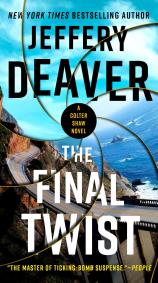Excerpt
Excerpt
The Final Twist: A Colter Shaw Novel

The Steelworks
Colter Shaw draws his gun. He starts silently down the stairs, descending into the old building’s massive, pungent basement, redolent of mold and heating oil.
Basement, he reflects. Recalling the last time he was in one. And what had happened to him there.
Above him, music pounds, feet dance. The bass is a runner’s heartbeat. But up there and down here are separate universes.
At the foot of the stairs he studies where he is. Orientation . . . Always, orientation. The basement is half built out. To the right of the stairs is a large empty space. To the left are rooms off a long corridor—fifty feet or so in length.
Scanning the empty space to the right, he sees no threat nor anything that would help him. He turns left and navigates toward the corridor past the boilers and stores of supplies: large packs of toilet paper, cans of Hormel chili, plastic water bottles, paper towels, Dixie paper plates, plastic utensils. A brick of nine-millimeter ammunition.
Shaw moves slowly into the corridor. The first room on the right, the door open, is illuminated by cold overhead light and warmer flickering light. Remaining in shadows, he peers in quickly. An office. File cabinets, computers, a printer.
Two bulky men sit at a table, watching a baseball game on a monitor. One leans back and takes the last beer from the six-pack sitting on a third chair. Shaw knows they’re armed because he knows their profession, and such men are always armed.
Shaw is not invisible but the basement is dark, no overheads, and he’s in a black jacket, jeans and—since he’s been motorcycling—boots. They’re not as quiet as the Eccos he usually wears but the beat bleeding from the dance floor overhead dampens his footsteps. He supposes it would even drown out gunshots.
The men watch the game and talk and joke. There are five empty bottles. This might be helpful: the alcohol consumed. The reaction-time issue. The accuracy issue.
If it comes to that.
He thinks: Disarm them now?
No. It could go bad. Seventy-five percent chance of success, at best.
He hears his father’s voice: Never be blunt when subtle will do.
Besides, he isn’t sure what he’ll find here. If nothing, he’ll slip out the way he came, with them none the wiser.
He eases past the doorway, unseen, then pauses to give his eyes, momentarily dulled by the office lights, a chance to acclimate to the darkness.
Then he moves on, checking each room. Most of the doors are open; most of the rooms are dark.
The music, the pounding of the dancing feet are a two-edged sword. No one can hear him approach, but he’s just as deaf. Someone could be in the empty room, having spotted him, waiting with a weapon.
Thirty feet, forty.
Empty room, empty room. He’s approaching the end, where a second hallway jogs right. There’ll be other rooms to search. How many more?
The last room. This door is closed. Locked.
He withdraws his locking-blade knife and uses the edge near the tip to ease the deadbolt back into the tumbler. He pulls on the door to keep the bolt from snapping back into place as he gets a new grip with the blade. After repeating a dozen times, the door is free. Knife away, gun drawn and raised, finger off the trigger.
Inside.
The woman is Black, in her early twenties, hair in a complicated braid. She wears jeans and a dusty gray sweatshirt. She sees the gun and inhales to scream. He holds up a hand and instantly holsters the weapon. “It’s okay. You’re going to be okay. I’m getting you out of here. What’s your name?”
She doesn’t speak for a moment. Then: “Nita.”
“I’m John. You’ll be all right.”
The place is filthy. Uneaten chili sits in a flat pool on a paper plate. A bottle of water is half drunk. There’s a bucket for a toilet. She’s not bound but she is restrained: a bicycle cable is looped around a water or sewage pipe and her ankle is zip-tied to the cable. Shaw shuts the light off. There’s enough illumination to see by.
Shaw looks back into the corridor. The flicker from the screen continues as the ball game continues. What inning is it? Would be important to know.
“Are you hurt?”
She shakes her head.
He takes his knife out and opens it with a click. He saws through the plastic tie and helps her to her feet. She’s unsteady.
“Can you walk?”
A nod. She’s shivering and crying. “I want to go home.”
Shaw recalls thinking of the game Rock, Paper, Scissors just ten minutes ago. He wishes he’d played harder, much harder.
They step into the corridor. And just then, Shaw thinks:
The third chair.
Oh, hell.
The six-pack didn’t need its own seat. Someone else was in the office watching the game.
And at that moment the third man comes down the stairs with another pack of Budweiser. Just as he sets foot on the concrete floor he glances up the corridor and sees Shaw and Nita. The six-pack drops to the ground. At least one bottle shatters. He calls, “Hey!” And reaches for his hip.
In the baseball room, the flickering stops.
–
Part One
June 24
The Mission
TIME UNTIL THE FAMILY DIES: FIFTY-TWO HOURS.
Chapter One
The safe house.
At last.
Colter Shaw’s journey to this cornflower-blue Victorian on scruffy Alvarez Street in the Mission District of San Francisco had taken him weeks. From Silicon Valley to the Sierra Nevadas in eastern California to Washington State. Or, as he sat on his Yamaha motorcycle, looking up at the structure, he reflected: in a way, it had taken him most of his life.
As often is the case when one arrives at a long-anticipated destination, the structure seemed modest, ordinary, unimposing. Though if it contained what Shaw hoped, it would prove to be just the opposite: a mine of information that could save hundreds, perhaps thousands, of lives.
But as the son of a survivalist, Shaw had a preliminary question: Just how safe a safe house was it?
From this angle, it appeared deserted, dark. He dropped the transmission in gear and drove to the alley that ran behind the house, where he paused again, in front of an overgrown garden, encircled by a gothic wrought-iron fence. From here, still no lights, no signs of habitation, no motion. He gunned the engine and returned to the front. He skidded to a stop and low-gear muscled the bike onto the sidewalk.
He snagged his heavy backpack, chained up the bike and helmet, then pushed through the three-foot-deep planting bed that bordered the front. Behind a boxwood he found the circuit breakers for the main line. If there were an unlikely bomb inside it would probably be hardwired; whether it was phones or computers or improvised explosive devices, it was always tricky to depend on batteries.
Using the keys he’d been bequeathed, he unlocked and pushed open the door, hand near his weapon. He was greeted only with white noise and the scent of lavender air freshener.
Before he searched for the documents he hoped his father had left, he needed to clear the place.
No evidence of threat isn’t synonymous with no threat.
He scanned the ground floor. Beyond the living room was a parlor, from which a stairway led upstairs. Past that room was a dining room and, in the back, a kitchen, whose door, reinforced and windowless, led onto the alleyway. Another door in the kitchen led to the cellar, an unusual feature in much of California. The few pieces of furniture were functional and mismatched. The walls were the color of old bone, curtains sun-bleached to inadvertent tie-dye patterns.
He took his time examining every room on this floor and on the second and third stories. No sign of current residents, but he did find bed linens neatly folded on a mattress on the second floor.
Last, the basement.
He clicked on his tactical halogen flashlight, with its piercing beam, to descend and see that the room was largely empty. A few old cans of paint, a broken table. At the far end was a coal bin, in which a small pile of glistening black lumps sat. Shaw smiled to himself.
Ever the survivalist, weren’t you, Ashton?
As he stared into the murk, he noted three wires dangling from the rafters. One, near the stairs, ended in a fixture and a small bulb. The wires in the middle and far end had been cut and the ends were wrapped with electrician’s tape.
Shaw knew why the two had been operated on: to keep someone from getting a good view of the end of the cellar.
Shining the beam over the back wall, he stepped close.
Got it, Ash.
As with the rest of the basement, this wall was constructed of four-by-eight plywood sheets nailed to studs, floor to ceiling, painted flat black. But an examination of the seams of one panel revealed a difference. It was a hidden door, opening onto a secure room. He took the locking-blade knife from his pocket and flicked it open. After scanning the surface a moment longer, he located a slit near the bottom. He pushed the blade inside and heard a click. The door sprung outward an inch. Replacing the knife and drawing his gun, he crouched, shining the beam inside, holding the flashlight high and to the left to draw fire, if an enemy were present and armed.
He reached inside and felt for trip wires. None.
He slowly drew the door toward him with his foot.
It had moved no more than eighteen inches when the bomb exploded with a searing flash and a stunning roar and a piece of shrapnel took him in the chest.
_
(c) 2021 Gunner Publications, LLC



